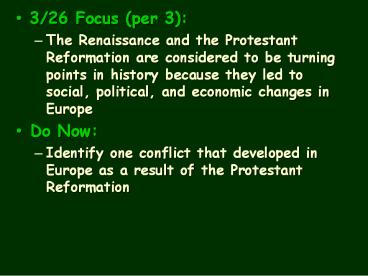3/26 Focus (per 3): - PowerPoint PPT Presentation
1 / 19
Title:
3/26 Focus (per 3):
Description:
... Illogical Used math ... developed during the 1600 s that relied on experimentation and observation in scientific inquiry Francis Bacon and Rene Descartes ... – PowerPoint PPT presentation
Number of Views:150
Avg rating:3.0/5.0
Title: 3/26 Focus (per 3):
1
- 3/26 Focus (per 3)
- The Renaissance and the Protestant Reformation
are considered to be turning points in history
because they led to social, political, and
economic changes in Europe - Do Now
- Identify one conflict that developed in Europe as
a result of the Protestant Reformation
2
- 3/27 Focus
- Protestant reformers challenged the authority of
the Roman Catholic Church and founded new
Christian Churches. - Do Now
- Other than military conflict, what was one other
impact of the Protestant Reformation on Europe?
3
- Causes
- Humanism led people to question church authority
- Some clergy were corrupt and interested in
worldly gain - Martin Luther posted 95 Theses protesting
indulgences - The Printing press helped spread Reformation
ideas
- Effects
- Many new Protestant churches develop
- Catholic Church began reforms
- Religious intolerance and anti-Semitism increase
- Religious conflicts spread across Europe
4
- 3/27 Focus
- During the Scientific Revolution, new ways of
thinking led to remarkable discoveries which
changed the way Europeans viewed the world. - Do Now
- List the steps in the scientific method.
5
- 4/13 Focus
- In the 1500s and 1600s, the Scientific
Revolution changed the way Europeans looked a the
world as people began to make conclusions based
on observation and experimentation. - Do Now
- What is reasoning?
6
The Scientific Revolution
7
The Scientific Revolution
- Period in the 1500s and 1600s in which
scientific thinkers challenged traditional ideas - Relied on observation and experimentation
8
Before the Scientific Revolution
- Geocentric Model of the Universe
- Greco Roman theories and Church taught that the
Earth was at the center of the universe
9
Before the Scientific Revolution
- The Renaissance and Reformation led many
scientists to challenge theories and question the
Church
10
Nicolaus Copernicus
- Polish Scientist that developed the Heliocentric
Model in the mid 1500s - Sun centered model
- Use mathematical formulas to suggest that planets
revolved around the Sun - Revolutions of the Heavenly Spheres
- Church rejected this theory
- Unbiblical, Un-Christian, Illogical
11
12
Johannes Kepler
- Used math to show that planets revolve around the
sun in a elliptical orbit - Based on the work of astronomer Tycho Brahe
- Mathematically showed Copernicuss ideas were
correct
13
Galileo Galilei
- Italian astronomer who provided evidence to
support the heliocentric model - Constructed the telescope to observe the skies
14
Galileo Galilei
- Galileo's discoveries challenged Church
teachings - Church placed him on trial for heresy
- Galileo forced to publically recant his ideas
under threat of death - Placed his writings on the list of forbidden books
15
With sincere heart and unpretended faith I
abjure, curse, and detest the aforesaid errors
and heresies of Copernicus and also every other
error . . . contrary to the Holy Church, and I
swear that in the future I will never again say
or assert . . . anything that might cause a
similar suspicion toward me.
16
Isaac Newton
- English scholar influenced by Copernicus and
Galileo - Used math to prove the Law of Gravitation
- Force which kept planets in their orbits around
the sun - Newtons Three Laws of Gravity
17
The Scientific Method
- Method developed during the 1600s that relied on
experimentation and observation in scientific
inquiry
18
The Scientific Method
- Francis Bacon and Rene Descartes played an
important role in developing the Scientific Method
19
Closure
- What is the Heliocentric Model?
- What was the Churchs reaction to Galileos
theories?































